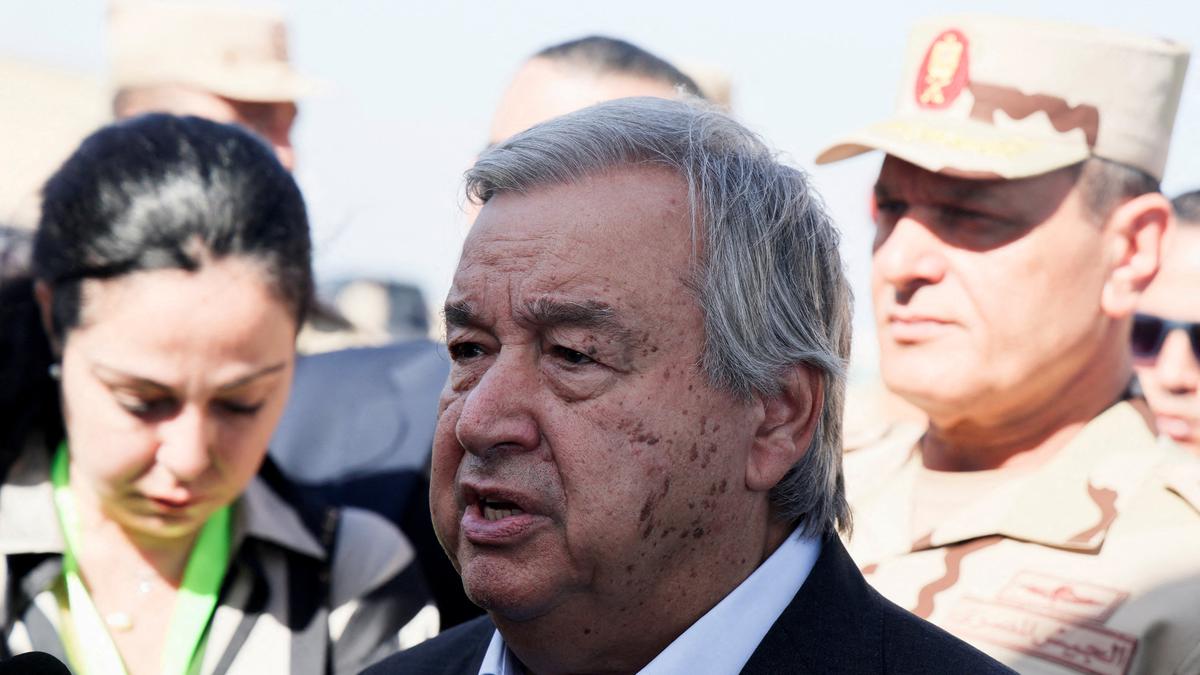
Eminent technology experts hailing from India have been named to a new global advisory body announced by UN Secretary-General Antonio Guterres to support the international community’s efforts to govern artificial intelligence.
The High-Level Multistakeholder Advisory Body on Artificial Intelligence, announced by the UN Chief here on October 26, brings together experts from the government, the private sector, the research community, civil society, and academia, and is focused on building a global scientific consensus on risks and challenges, helping harness AI for the Sustainable Development Goals, and strengthening international cooperation on AI governance, a statement said.
Among the members of the advisory body are the Secretary-General’s Envoy on Technology Amandeep Singh Gill; co-founder of iSPIRT Foundation, a non-profit technology think tank that has conceptualised India Stack, Health Stack, and other digital public goods Sharad Sharma and Lead Researcher at Hugging Face, India Nazneen Rajani.
Addressing reporters here, Mr. Guterres said “In our challenging times, AI could power extraordinary progress for humanity.
“From predicting and addressing crises to rolling out public health services and education services, AI could scale up and amplify the work of governments, civil society and the United Nations across the board,” he said.
Mr. Guterres noted that for developing economies, AI offers the possibility of leapfrogging outdated technologies and bringing services directly to people where needs are bigger and for the people who need them most.
Before he was appointed the Secretary General’s Envoy on Technology, Mr. Gill was the CEO of the International Digital Health and Artificial Intelligence Research Collaborative (I-DAIR) project, based at the Graduate Institute of International and Development Studies, Geneva.
Previously, he was the Executive Director and Co-Lead of the United Nations Secretary-General’s High-Level Panel on Digital Cooperation (2018-2019).
Mr. Gill was India’s Ambassador and Permanent Representative to the Conference on Disarmament in Geneva (2016-2018).
Mr. Sharma also co-founded Teltier Technologies, a wireless infrastructure startup now part of CISCO. An active angel investor with over two dozen investments, he was instrumental in the success of India’s first IP-focused fund, the India Innovation Fund. He is a member of the National Startup Advisory Council, Securities and Exchange Board of India’s (SEBI) Financial and Regulatory Technology Committee and chairs the International Financial Services Centres Authority’s (IFSCA) Expert Committee on Asset Tokenization and the Taskforce on Digital Public Infrastructure in the ThinkTank20 (T20) group of G20.
Ms. Rajani is the Research Lead at Hugging Face, specialising in AI Safety and Alignment, leveraging Reinforcement Learning with Human Feedback (RLHF). She is recognised as an expert and thought leader in Large Language Models (LLMs) robustness and evaluation. Before her tenure at HuggingFace, Ms. Nazneen successfully led a team of esteemed researchers at Salesforce Research, dedicated to developing robust natural language generation systems built upon LLMs, according to her profile.
Ms. Rajani earned her Doctorate in Computer Science from the University of Texas at Austin, where her research focused on Natural Language Processing (NLP) and the interpretability of Machine Learning models.
She has over 40 publications in premier conferences and her research has garnered significant attention from prominent media outlets.
Other members of the advisory body include President of the Patrick J. McGovern Foundation, U.S. Vilas Dhar; President and Founder of Eurasia Group Ian Bremmer; Special Advisor to the Minister of Justice and Public Security, Federal Government of Brazil Estela Aranha; Secretary of State for Digitalisation and Artificial Intelligence of Spain Carme Artigas; Chief Innovation Officer and Deputy Director General at Clalit Health Services Israel Ran Balicer; Aerospace Coordinator of the German Federal Government Anna Christmann; Chief Responsible AI Officer at Microsoft Natasha Crampton and Associate Professor at the University of Tokyo Arisa Ema.
Mr. Guterres said the transformative potential of AI for good is difficult even to grasp. “And we are in urgent need of this enabler and accelerator,” he said.
He noted that many countries are already reeling from the impact of the climate crisis. The 2030 Agenda – our global blueprint for peace and prosperity on a healthy planet – is in deep trouble.
“AI could help to turn that around. It could supercharge climate action and efforts to achieve the 17 Sustainable Development Goals by 2030,” he said adding that all this depends on AI technologies being harnessed responsibly, and made accessible to all – including the developing countries that need them most.
He stressed that as things stand, AI expertise is concentrated in a handful of companies and countries, and this could deepen global inequalities and turn digital divides into chasms.
“The potential harms of AI extend to serious concerns over misinformation and disinformation; the entrenching of bias and discrimination; surveillance and invasion of privacy; fraud, and other violations of human rights,” Mr. Guterres said.
He said without entering into a host of doomsday scenarios, it is already clear that the malicious use of AI could undermine trust in institutions, weaken social cohesion, and threaten democracy itself.
“For all these reasons, I have called for a global, multidisciplinary, multistakeholder conversation on the governance of AI so that its benefits to humanity – all of humanity – are maximized, and the risks contained are diminished,” he said adding that the new Advisory Body is the starting point for it.
The UN statement added that the formation of the AI Advisory Body marks a significant step in the United Nations’ efforts to address issues in the international governance of artificial intelligence.
The new initiative will foster a globally inclusive approach, drawing on the UN’s unique convening power as a universal and inclusive forum on critical challenges, it said.
The Body will help bridge other existing and emerging initiatives on AI governance, and issue preliminary recommendations by end-2023, with final recommendations by summer 2024, ahead of the Summit of the Future.

COMMents
SHARE